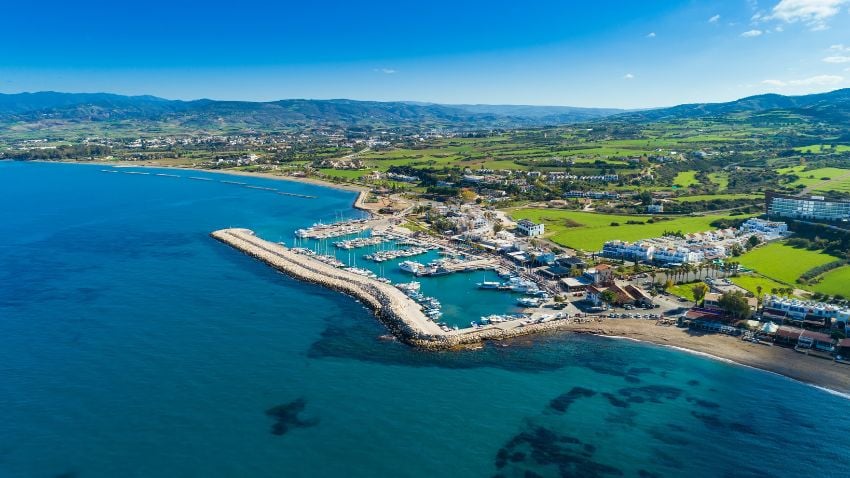Best Cities To Live In Mexico In 2026
Mexico remains one of Latin America’s most compelling destinations, especially for North Americans. More than a million expats call it home, and tens...

5 min read
The European Union (EU) and the European Economic Area (EEA) have recently introduced the European Travel Information and Authorization System (ETIAS), affecting visa-exempt nationals from various countries.
If you’re an American, Canadian, Australian, New Zealander or a citizen of any of the countries listed here looking to travel to any of these European countries, you must be aware of some new entry requirements.
Previously, citizens from these nations had visa-free travel to multiple destinations, as their passports were among the strongest in the world. For example, US passport holders can travel to 184 countries without a visa as of the time of writing. However, due to the implementation of the ETIAS, they will now need to follow some additional steps before setting foot in Europe.
In this article, we’ll walk you through everything you need to know about this new system, including its purpose, application process, validity and compliance requirements. Let’s jump right in and ensure you’re fully prepared for your next journey to Europe before it's too late.

To enjoy this beautiful sunset in Malta, you will need an ETIAS travel authorization
The European Travel Information and Authorization System (ETIAS) is a recent development by the EU to improve security measures and safety within the Schengen Area, which now is a region of 29 European countries that have abolished their internal borders to allow the free and unrestricted movement of people (according to SchengenVisaInfo.com).
It’s essential to note that the ETIAS is not a visa but an electronic travel authorization acting as a visa waiver for citizens of specific visa-free countries. This means that travellers from the US, Canada, Australia and New Zealand, among others, will need to get an ETIAS before visiting any Schengen country.
ETIAS is associated with a traveller’s passport and is valid for up to three years or until the passport expires. However, it’s essential to note that having an approved ETIAS doesn't grant automatic access to the Schengen Area. Upon arrival at the border crossing point, border guards will verify whether travellers meet all the necessary entry requirements.
Applying for an ETIAS travel authorization involves filling out an online application form. Travellers can access the form through the official ETIAS website or mobile app. The application fee is €7 ($7,68 USD), which will go to the EU’s budget. Certain travellers, such as minors and individuals over 70 years old, may be exempt from this fee.
Most ETIAS applications are expected to be processed within a few minutes, offering travellers a smooth and efficient experience. However, the process may take up to four days in some cases. This time frame can extend to 14 or 30 days in exceptional situations.
Therefore, applying for this travel authorization in advance is advisable to avoid last-minute delays and complications. Don’t let this ruin your plans!
Upon applying, travellers will receive a confirmation email that includes a unique ETIAS application number. Keep it for future reference throughout the travel process. Once the application has been processed, travellers will receive another email communicating the outcome – whether the ETIAS has been approved or refused.
In the event of refusal, the email will provide detailed reasons for the decision. It will also outline the steps for the appeal process and include information about the competent authority and the deadline for presenting an appeal.

This electronic travel authorization works like a visa in practice for Estonia and the other countries listed
For travellers holding a valid ETIAS travel authorization, there are specific requirements to keep in mind before and during their journey to Europe.
First and foremost, it’s crucial to present the approved ETIAS document before boarding any flight, ship or bus destined for Europe. Failure to do so may result in denied boarding.
Once travellers arrive at the border crossing point in the Schengen Area, they’ll be asked to present their valid ETIAS travel authorization, their passport, and any other necessary documents. The information on the ETIAS has to match the details in the traveller’s passport accurately. Any discrepancies may lead to refusal of entry into the country.
While having an ETIAS allows travellers to stay in the listed European countries requiring ETIAS for up to 90 days within any 180-day period, it’s crucial to adhere to this time limit. If travellers need to stay more than 90 straight days, they’ll need a special visa for the country they want to stay in.
It’s also essential to carry the same travel document used during the ETIAS application process. As the ETIAS is linked to the passport, travellers must use the same document the authorization was granted for. Otherwise, they might not be allowed to board transportation or enter any European countries requiring ETIAS.
To ensure a smoother and hassle-free experience while travelling to Europe with an ETIAS travel authorization, travellers are advised to follow this checklist:
Apply for ETIAS in advance, ideally before purchasing flight tickets or booking accommodations;
Double-check that the passport details in the ETIAS authorization match those in the traveller’s passport;
Verify the validity period of the ETIAS travel authorization and the allowed duration of stay;
Ensure the passport is valid for at least three months after the intended departure from the European countries requiring ETIAS, as some exceptions may apply.
By adhering to these recommendations, travellers can confidently avoid potential issues and enjoy a smooth trip to Europe.

Italy was not left out of the list of countries that require ETIAS
According to the EU, the introduction of the ETIAS system is a response to security challenges it has been facing, such as irregular immigration and other threats.
Europe’s open borders and visa-free travel for certain nationals have made the Old Continent an attractive destination for tourists, business travellers and individuals seeking better opportunities.
However, this openness has also come with risks and issues related to border controls. The ETIAS system is intended to address these concerns and strengthen Europe’s ability to protect its citizens and visitors.
In recent years, some European cities have experienced a rise in crime and unsafety, so the ETIAS system employs a strict vetting process, including checks against various databases such as the Schengen Information System, Europol Data and others. This helps identify individuals who may pose a security risk or are involved in illegal activities. By doing so, the EU aims to prevent unauthorized entry, increasing safety within its borders.
While most travellers from the US, Canada, Australia and New Zealand (among others) will need to get an ETIAS travel authorization, there are certain exemptions and cases to consider:
Transit: Travellers transiting through the Schengen Area without leaving the international transit zone don’t require an ETIAS;
Minors: Children under the age of 18 will need to apply for an ETIAS, but they are exempt from paying the application fee;
Seniors: Travellers over the age of 70 are also required to apply for an ETIAS but are exempt from the application fee;
Long-term Stays: For travellers intending to stay in the Schengen Area for more than 90 days within a 180-day period or for specific purposes such as work, study, or family reunification, a different type of visa or residence permit will be required.
As mentioned earlier, ETIAS is valid for up to three years or until the passport used in the application expires. If a new passport is issued, travellers will need to apply for a new ETIAS travel authorization.
It’s essential to remember that ETIAS is exclusively for short-term stays of up to 90 days within any 180-day period. Travellers who wish to stay in the Schengen Area for longer periods must obtain a visa or residence permit for the specific purpose of their stay.
Related content: The Basics Of How To Get A Second Passport Or A Second Residency

If you need to stay more than 90 straight days in Spain, you’ll need a special visa
The implementation of the ETIAS represents a troubling new entry requirement for visa-exempt travellers to the Schengen Area, including citizens from the US, Canada, Australia and New Zealand. Many nationalities with great freedom of movement will now have to go through an extra layer of complexity to travel to Europe. Sporadic escapades are gone.
While the stated goal of ETIAS is to improve security and ensure the safety of the Schengen Area and its citizens, it is a pretext to limit and control travel freedoms. This additional step relies on extensive vetting processes, database checks and detailed application reviews, giving the authorities more control over travellers’ movements.
To access these countries, applying for ETIAS in advance becomes a must. This will ensure a smoother experience, as the process could take a few days, and in certain situations, up to 30 days if additional information or an interview is required. While an ETIAS travel authorization is not a visa, it plays a crucial role in granting short-term stays of up to 90 days within any 180-day period. This bureaucratic burden is an attack on free travel, hindering the possibility of exploring Europe with ease and spontaneity.
All in all, this authorization adds a new layer of difficulty to any trips you want to do. Still, as long as you take care of this in advance and follow all the tips included in this article, you should enjoy a memorable adventure across the Old Continent. Make sure to apply before it’s too late to avoid denied boarding and ensure your trip goes as planned.
If you want the best intel from the expat world, including profitable offshore opportunities, little-known tax-saving strategies, and hard-won insights on immigration, passports, and Plan-B residencies, all delivered to your inbox every single week, then join our daily correspondence, EMS Pulse®. Currently enjoyed by over 84,000 expats and expat-hopefuls worldwide. Fill in the form below to join our newsletter free:

Written by Mikkel Thorup
Mikkel Thorup is the world’s most sought-after expat consultant. He focuses on helping high-net-worth private clients to legally mitigate tax liabilities, obtain a second residency and citizenship, and assemble a portfolio of foreign investments including international real estate, timber plantations, agricultural land and other hard-money tangible assets. Mikkel is the Founder and CEO at Expat Money®, a private consulting firm started in 2017. He hosts the popular weekly podcast, the Expat Money Show, and wrote the definitive #1-Best Selling book Expat Secrets - How To Pay Zero Taxes, Live Overseas And Make Giant Piles Of Money, and his second book: Expats Guide On Moving To Mexico.

Mexico remains one of Latin America’s most compelling destinations, especially for North Americans. More than a million expats call it home, and tens...

South Korea is far more than K-pop and K-dramas. It is a country known for outstanding food, from bustling street markets to high-end dining, as well...

Asia is one of the most fascinating regions in the world for travel, offering an extraordinary mix of cultures, histories, and landscapes. From...